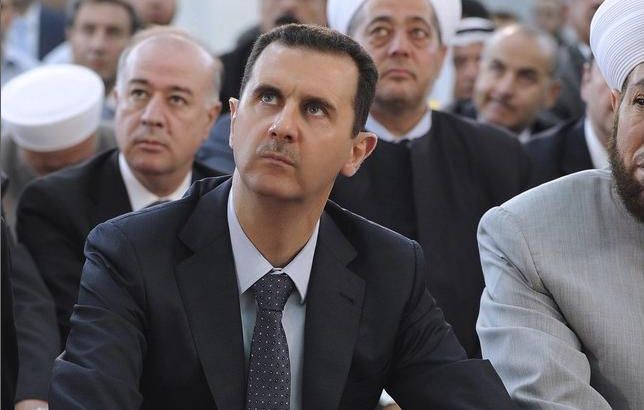Eid in Syria marred by fighting
Clashes continue as President Assad makes his first appearance in public since a July bombing killed security chiefs.

Dozens of people were reported killed across Syria on the first day on the Muslim Eid al-Fitr holiday, as clashes between the army and rebels continued.
Meanwhile, President Bashar al-Assad was shown on state television making his first appearance in public since a July bombing that killed four top security officials, attending prayers at a Damascus mosque on Sunday.
Syrians held prayers and staged demonstrations for Eid, marking the end of the fasting month of Ramadan for
the second year under the shadow of a conflict the UN says has killed more than 17,000 people.
Some complained they could not make the traditional visit to cemeteries to place flowers on the tombs of departed loved ones because of security fears.
Six children, including four from the same extended family, were killed by shelling near their home in the rebel-held town
of Maarat al-Numan in the northwestern province of Idlib, the UK-based Syrian Observatory for Human Rights said.
In other parts of the country, troops were also reported to have bombarded the besieged city of Rastan, in the central province of Homs, and the eastern city of Deir al-Zor.
The opposition Local Co-ordination Committees said 157 people were killed across the country, 51 of them in Deraa province and 47 in Damascus suburbs.
In Aleppo, a lull in fighting in some of the embattled neighbourhoods gave residents a rare opportunity to search for the dead and to retrieve some of their belongings from their destroyed homes.
But clashes raged in the Saif al-Dawla and Izaa districts in the city which has been a key battleground of the conflict since rebels launched an offensive there one month ago.
“There is no holiday,” said Mohammed Radwan, 34, standing near an apartment building in Aleppo’s Tariq al-Bab neighbourhood, which was hit by an airstrike the day before.
“The electricity comes and goes, the jets fire on us and no one has any work. All we’ll do today is clean up the rocks and
rubble.”
Fierce fighting continued to rage between rebel fighters and government forces for control of the city’s international airport, a strategic target for both sides.
‘Neutralised inside a city’
Brigadier General Mark Kimmitt, a former US state department military adviser, told Al Jazeera that the rebels have managed to persevere largely because of the nature of urban warfare.
“As we always see in urban terrain, the advantages that are held by a technologically superior military, such as the Syrian army, those advantages of aircraft, of tank, those are in many ways neutralised inside a city,” he said.
|
Al Jazeera’s Stefanie Dekker reports on sombre Eid celebrations in Turkey refugee camps |
Amid the violence, Syria’s state-run TV aired footage of Assad at prayer with his government and Baath Party officials in al-Hamad mosque.
“Syria will triumph against the Western-American plot being supported by the Wahhabis and takfiris,” or Sunni Muslim hardliners, said imam Sheikh Mohammed Kheir Ghantus, echoing the regime’s long-standing rhetoric.
Shaken by a July 18 bomb attack in Damascus and defections – including that of his last prime minister – Assad’s recent
appearances on state TV had previously been restricted to footage of him conducting official business. He was shown
swearing in the new prime minister a week ago.
He appeared on Sunday without his vice president, Farouq al-Sharaa, whose whereabouts have been subjected to much speculation in recent days.
He is said by some members of the opposition to have defected, but on Saturday, his office denied the reports and said Sharaa “did not think, at any moment, of leaving the country”.
Brahimi denial
The latest developments came as Lakhdar Brahimi, the new UN-Arab League Joint Special Representative in Syria, denied making comments that that it was too soon for Assad to step down.
In an interview with Al Jazeera on Sunday, veteran Algerian diplomat Brahimi said that for him, it was “too early to have a say” on whether Assad should quit.
“I could not talk about such a matter or any other matters unless I arrive in New York or Cairo to see what is the plan to be carried out,” said Brahimi.
Reports of the alleged comments on Saturday had caused fury among Syrian dissidents and the opposition Syrian National Council (SNC) described the comments as “unacceptable”.
“The revolutionary Syrian people were shocked and dismayed by Mr Lakhdar Brahimi’s statements,” the SNC said in a statement.
“We call on the international envoy – who has not yet consulted with any Syrians on his appointment or his mission – to apologise to our people for taking this unacceptable position,” it added.
Brahimi told Al Jazeera that he has asked the SNC for an apology. “They should call and ask me to make sure if I said so,” he said.
Also on Sunday, the last 100 of 300 UN monitors who had been in the country prepared to leave Syria.
The UN observers’ departure comes after the UN Security Council agreed to end the mission and support a small new liaison office that will support any future peace efforts.